My guest on the show today is the awesome Eric Enge. He is the founder of Pilot Holding and my co-author on all four editions of The Art of SEO. He’s built and sold four companies, including Stone Temple Consulting, an award-winning digital marketing agency acquired in 2018. His latest book, Using Generative AI for SEO, cuts through the hype to reveal what actually works.
In our conversation, we discuss why setting realistic expectations—like 25-30% efficiency gains instead of 4X productivity—is the key to sustainable success with AI tools. Eric breaks down the difference between what large language models do exceptionally well (summarization, outlining, brainstorming) versus where they consistently fall short (producing publish-ready content). Eric explains why link building isn’t dead and why multi-channel presence matters more than ever. We also explore the importance of covering low-search-volume topics that demonstrate true expertise, and why Google’s “just create great content” advice omits critical truths about how the search ecosystem actually functions. This conversation will recalibrate your AI strategy around what delivers real results instead of empty promises. So without any further ado, on with the show!
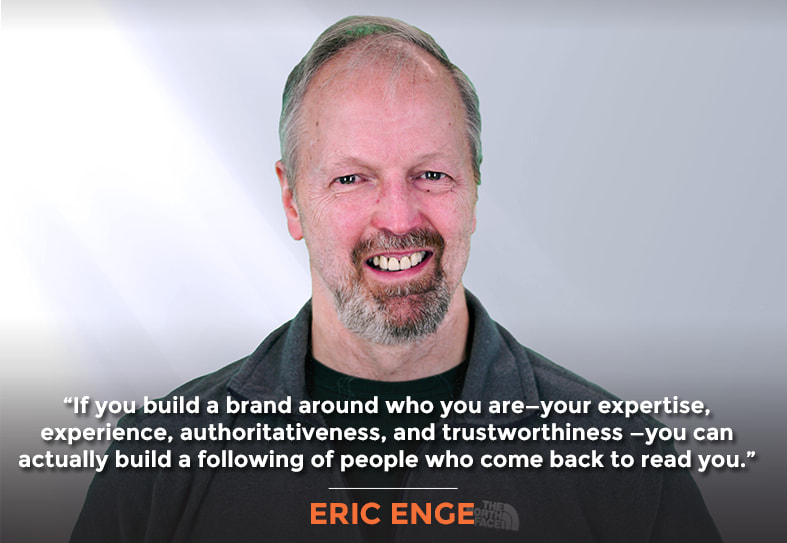
In This Episode
- [03:54] – Eric Enge shares his excitement about change and the opportunities it brings, contrasting it with the fear many people feel.
- [08:53] – Eric provides practical tips for using AI tools like ChatGPT, such as summarizing large documents and creating custom birthday cards.
- [17:26] – Stephan adds examples of using AI for video summarization and content creation, highlighting the efficiency gains.
- [24:47] – Eric debunks the myth that link building is dead, explaining its importance in establishing topical authority.
- [29:27] – Eric explains the components of E-A-T (Experience, Expertise, Authoritativeness, Trustworthiness) and their importance in building a strong brand.
- [35:52] – Stephan and Eric agree on the need for a balanced approach to SEO, combining great content with an understanding of Google’s business goals.
- [40:53] – Eric emphasizes the need for a multi-channel approach to content creation, leveraging AI tools alongside traditional methods.
- [46:47] – Eric elaborates on the need for continuous learning and adaptation to stay ahead in the rapidly evolving landscape of AI and SEO.
Eric, it’s great to have you back.
Well, thanks, Stephan, it’s great to be back. Looking forward to chatting with you today. There’s just so much going on. It’s a kind of fun time to be in the industry.
No, it’s a fun time to be alive. I mean, there’s so much change in the world, if you like change, this is a great time to be alive, yeah?
Well, if you have an entrepreneurial mindset, change is essential to success.
Yeah, right, yeah. There’s a great little book all about change —how to acclimate to it and get your team to acclimate to it. It’s called Who Moved My Cheese. Have you heard of that little book?
I’ve heard of it, but I haven’t actually read it, I’m afraid.
Yeah, it’s a cute book. It’s been a long time since I saw that. But the premise here is that people don’t like change. They like stability. They like certainty. And when you rock that certainty, then they feel very unsafe. It’s like you took their safe space away. And that’s a problem, because we need to become more and more comfortable with being uncomfortable as this world changes at a faster and faster clip.

One thing that you’re doing to help ameliorate the challenge for people of all this uncertainty is provide them a road map with this new book on using generative AI for SEO purposes, because it’s essential to use AI across all industries, all different kinds of disciplines. If you don’t, you’ll get left behind. You’re not going to proceed at a fast enough clip in comparison to your competitors, who are using AI. So let’s talk a bit about what inspired you to come up with this book, and why now, and why not in a year from now or a year before when it came up?
Yeah, well, I’m going to give you, if you don’t mind, just a little bit of the short backstory. I mean, sold the company, Stone Temple, in 2018, had three years in the contract to work with the proficient acquiring company, did that and exited in 2021, and you know, the idea, more or less, was to retire, or at least mostly retire. But unlike the phenomenon you talked about, where most people are afraid of change, I find change exciting, and I think of it as an opportunity. And that’s probably because of that entrepreneurial mindset that I have, which is that, well, change defines opportunity, or creates opportunity, I should say.
So, the retirement I was going to take became more of a partial retirement because something new and disruptive happened. I can’t pass up a good revolution. I mean, it excites me. It’s the exact opposite effect. And I think that’s true of anybody who’s a successful entrepreneur. So it’s just going to start with my first tip of the day, which wasn’t directly related to your question: don’t be afraid of it. Embrace it. There’s so much that you can create for yourself by being one of the people who first begin to understand what the change means. And this is where I get back to your original question. That’s why I got involved in writing the book, right? Is to help people navigate this change and figure out how to practically apply AI.
Right? And so when you say, embrace change rather than fear it, what’s the practical way to do that, because it’s easy to say it’s hard to do if you are actually in fear or in fight, flight or freeze, I should say, So, what is a practical way for somebody to become more amenable and actually excited about change?
It’s a great question, because if that fear is stopping you from moving forward, you need to, well, find ways to start small. Just learn a little bit about it, demystify it. Lots of people will be writing about things related to the change of course. Find the people you know and trust who are genuine experts in the area, and learn from them.
And just take it a day at a time, learn one thing, then learn the next, and then build an understanding of where to go with it and what it means to you. If you try to absorb the whole thing all at once, then you’re going to fall back into your fear, and you’re going to get afraid of it. So you’re much better off taking small steps and making little bits of progress rather than trying to figure out everything all at once.
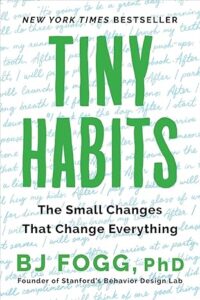
Yeah, yeah. That’s a great tip, and it reminds me of a book I really think highly of; I’ve had the author on this show. It’s BJ Fogg, and his book is called Tiny Habits, which is all about how to establish habits by going and breaking them down into really small components and then getting that feeling of success, what he calls shine, getting that shine feeling going where you want to stack those tiny habits on top of each other, and then next thing you know, you’re actually doing the thing that you thought you would never do, the thing you were procrastinating.
Right? I mean, that’s a really great way to put it: taking those small steps and building and stacking successes —it just does so much for your confidence. Helps you get past the fear. You start getting benefits from the change, and then things accelerate for you, and it’s a great way to be about it.
Yeah, yeah. So check out that episode. Listen to BJ Fogg if you’re interested in learning more about habit stacking and creating tiny habits. So I’m curious. Let’s say we give our listener their first tiny habit or tiny step to help them navigate this new AI era, what would it be? I’ll just give you an example to warm you up.
So let’s say someone isn’t using the ChatGPT app, or if they are, they’re not actually talking to it and getting it to respond. That’s a very easy, simple thing. It takes just a couple of minutes to install the app, and then you tap the circle icon to start a voice chat session. And you can start having conversations while you’re driving, walking to the park, or whatever, which just makes it more attainable, more friendly, and you’re doing something that a lot of people aren’t even doing.
Yeah. I mean, I love the example of using it with the voice extension while you’re walking, because you can ask questions about what you’re seeing and get meaningful text-based responses without having to look at anything or click any links, right? And get some answers to questions. And that’s a really nice way to use it, basically just to become personally familiar with it.
So I’m going to give you a similar thing from a business perspective, which is, let’s say that you just got a large PDF file from someone, or a large web page that somebody sent you that you needed to go analyze and read.
A very simple formula for success: oversimplify it. Do the hard things that other people won't, and you become in demand. As long as you choose the right hard things to do, that’s where satisfaction comes. Share on XJust ask ChatGPT or your favorite apps to summarize it for you. Tell me the five most important things in this piece of content. And it happens to be one of the things that the large language models, like ChatGPT, Gemini and Claude, and others do really well, right? The error rate is quite low, so you usually. Get an excellent summary of the article. And that’s not like the biggest win you could potentially get out of all this, but it’s real. You know, you could take something that was going to be 30 minutes of reading and distill it down to 5 to 10, and that’s a big win.
I mean, we’re just a wash with so much content, especially video content, and that is time-consuming. So if somebody just gets used to, for example, using NotebookLM from Google, or they’ll use maybe a specialized app for YouTube videos like Recall, which is, get recall.ai, then the videos will get summarized, and with NotebookLM, for example, that actually can create a mock podcast between two fictional AI characters who are riffing back and forth, explaining the concept in.
Let’s say that PDF that you upload, or that YouTube video that you gave it, or a whole series of YouTube videos, and then you’ll be able to listen to that on your way to work or while working out or taking a walk. And that is going to reduce the time and effort required to learn new things and keep up with your industry or the technology, and so forth.
I’ll give you another one: let’s say you want to make a custom birthday card for someone, and you have a picture of them, maybe they’re in your family, right? And you have a picture of them celebrating something with a family. It’s just a great picture of everybody together. But you also happen to know that they’re really into anime, so you can upload the picture and say, “Hey, can you, like, convert all these people into anime figures?” and it will do it for you and give it back to you?
Small, consistent steps toward mastering change will always beat trying to learn everything at once.
Yeah, like in the style of Studio Ghibli, which was really not very well received by the Studio Ghibli folks who care about protecting their copyrights, but whatever, I guess, OpenAI didn’t really care about that. So, like, surprisingly good too. It’s really, really good. It looks like it’s coming out of Studio Ghibli. If you give it that prompt to emulate Studio Ghibli.
It does. And I actually learned about this idea, I don’t know, six nine months ago or something, from a friend’s daughter in law, who made a series for her husband, which was actually, it was like a cartoon with about 12 converted pictures, or actually converted one picture, and then she told it to now use the same figure, but put it in this situation, only one picture was provided, And then the rest of the frames in the 12 frame story that she was telling were completely created by ChatGPT, but it was very, very well done and very neat little kind of additional gift for his birthday.
That’s cool. Well, you can put that in a business context and say, “Well, I want to make a mock commercial. I want it to be a video. I want the person — let’s say the spokesperson, the founder, or whatever — holding the product in their hand and sitting or standing on a mountain top.” And you can prompt that into the tool, whether you’re using ChatGPT.
I found that Gemini Nano Banana works really well for replacing, let’s say, a background, putting something in the foreground, or putting something in their hand, or whatever. It seems to better maintain the integrity of the main character than ChatGPT does. But at the moment, that might be true, but in six weeks or a few weeks, whenever this episode airs, that might be different. So things change very rapidly in the AI space, but I’m a fan of nano banana, which is a pretty silly name that was the internal name within Google, and I guess it stuck.
One neat thing about this idea, too, about playing with pictures this way, is that it allows you to do some things that aren’t possible under the pressure of a business environment. So it’s a personal environment. If it doesn’t go exactly right, you can just throw it away, you know, I mean, and try again, or give up on the idea, whatever. There’s no pressure. And that’s kind of a nice way to put yourself in a situation where fear doesn’t block you from trying to do something.
Yeah, yeah. I would like to be an experimentalist, try stuff out, and, with video creation, create an image, maybe a start image and an end image, and then animate it using a different tool, like Hailuo.
So, if you wanted to kind of give some of your best tips from your book, what would be some of the things that they could do to improve their SEO using AI-based tools and prompts?
One of the popular areas people like to think about using Gen AI is for content creation. And here we are. We’re almost three years in since ChatGPT came out, and it’s still not really ready to just have it, give it an idea, and ask it to go write an article. It writes the article, and you publish it; that’s still not a good concept. And one of the really bad things that happened, especially very early on, was that people were saying, “I can lay off all my writers,” or “I had the power of 1000 writers at my fingertips.” And the answer is, No, you don’t.
So there are benefits. I’ll get to that, but the first thing you need to do is set your sights on what the right type of gain is to think about. And it’s really important to set those objectives properly. So if you’re thinking you’re going to cut your writing costs in half and triple your throughput, you’re probably going to run into problems. And I know many people who have tried that, and it has not worked out well for them, so I really want to urge you not to think about it that way.
Think of AI as a brainstorming partner for your content team. It can boost efficiency and creativity while keeping your experts at the heart of the process.
One of the first big points that I make in the book is to think of 25-30% gains specific to a content creation perspective. There are other things where the gains are larger. But that’s not as exciting as imagining you’re going to make your throughput forex and get rich. The problem is, if you could really do 4x, then 100,000 people would already be doing it, and it would be the new norm. So you don’t get any edge out of that anyway.
But if you think about this 25-30% improvement in cost and throughput as a goal, you start thinking about how you might approach it differently. So this is a core concept that I really want people to get their head around. And there are some things that all the Gen AI tools do reasonably well. They can suggest article topics. They can create outlines for an article. It can research facts, statistics, and trends and potentially even create short drafts that you can have somebody else take and run with from there. The first part is getting that scope of objective right, and then you can begin engaging at the next level.
Yeah. So, I mean, there are certain use cases where it’s surprisingly good, like infographic creation. If you give it the right kind of brief or prompt, you’ll get a great infographic back. Might need some tweaks, but this is part of the process, and if you use it for fact-checking, spell-checking, grammar, and all.
Success-rated summarization is extremely high. I mean, there’s a case where you get a much higher level of gain that obviously, really, a 25-30% metric is if you’re thinking about using it to improve content creation, you know, just text authoritative content creation.
Yeah. And one of the techniques that is being espoused these days for optimizing for the LLMs is to have, like, a TLDR too long, didn’t read summary at the beginning of the article or key highlights, and that’s a summarization task. Yeah, so that would be great for the AI to do.
Yes, it would. So, psychology, I’m not sure ‘psychology’ is the right word here, but the approach I suggest is to think of AI as a brainstorming partner for your content-creation team. This is powerful in many ways. Some of the things will be done way more efficiently than your content creator. Hopefully, your subject matter expert is involved at some point in this process, which includes generating outlines.
In fact, the way I think about that is because there’s definitely a certain amount of randomness in the LLMs. Have it generate three outlines for you, then parse through them, toss out the stuff you don’t want, and create one integrated outline to run with.

It’s a great way to make sure your article is more comprehensive. Because even if your subject matter expert is doing the writing for you, and you know, they’re going to bring this wealth of knowledge for them, and they could probably generate a great outline, they’re still going to forget a couple of things. They’re human, but having them leverage the AI increases the probability that the AI will actually fill the gaps they meet.
So what about tying in to keyword research using AI, using maybe Ahrefs and the MCP Server? In that, what? What’s your advice on that?
So, I mean, I think it’s a great tool for keyword research from a couple of different dimensions, and one of which is using it without tying it into Ahrefs or anything else, because it steps back from the context of search volume, which those of us in the SEO world have been married to search volume for a long period of time. But search volume is a bit of a trap. It’s a trap because it leads you away from creating the content you probably should be creating.
Search volume can be a trap; it distracts you from building real topical authority.
I’m of the School of people who believe that Google is using a process to assess your topical authority based on the density of topics that you have related to a particular topic area. What I’m going to explain here is a little bit complex. So bear with me a moment, if the listeners aren’t familiar with embeddings. Embedding vectors are used to understand the meaning of a piece of content. The meaning of a piece of content could be what LLMs and the search engines call a token, which is approximately the size of a word. It can actually be part of a word or a couple of words, but it’s a smallish piece of content.
And then there are passages which might be a single concept, and then there are whole web pages. And all of these things can be assigned to these vectors, which define what they’re about and what they’re really good at, helping determine the relevance of a piece of content. So the reason I went through that is that the way I believe search engines understand topical authority, at least one way, is by the quantity of topics you have that are highly relevant to a topic area that’s search-volume-independent. Yes, you need to have the major pieces, but there’s probably content you should be writing to show zero search volume in your tools.
So let’s say you’re writing about auto warranties. What do auto warranties do? Is a very basic sort of head term, type of concept around auto warranties, but something that would be a very particular term might be something like, does a particular Auto Warranty vendor cover this specific situation, which might be that your radiator went out on you while you were driving from point A to point B and and what does that coverage look like? That’s a very specific question that you probably wouldn’t put in your general article about auto warranties, or even about the individual vendor, right?
The more our world is evolving—and Gen AI is the latest element of that—the more fractured the channels are going to become, and the more important it is for our business to be multi-channel. Share on XSo most people wouldn’t try to cover that topic, and maybe they should. And doesn’t necessarily mean it’s its own web page. It might be within a given page, but when terms get very specific, most people stop. They don’t cover it, so they end up with surface-level coverage of a topic. Unfortunately, they don’t understand that 35% or more of the world’s search volume is in these very, very specific questions. So if you don’t answer them, you’re ignoring 35% of your potential audience, and you don’t want to do that.
This is important because it helps Google identify topical authority, one of the factors it considers. The other major thing that does that and still matters to that is links, but from the content perspective, they want to see that you have deep coverage of the topic, so no matter what question the user has, they’ll be able to get an answer from you.
Yeah. So if you’re not going deep into all the subtopics, then it looks like thin content. It looks like you’re not an expert in that topic space, and you’re not going to do as well on Google or with LLMs like ChatGPT, right? You don’t have depth of coverage, and that’s what it’s all about. Yeah. Some people say link building is dead, but I think the opposite is true. But I’m curious about your take?
Topical authority isn’t about link volume; it’s about relevance.
Right? Well, you just type the SMH next to me, but yeah, no —it’s definitely not. And the LLMs actually care about links, citations,and processes. And the thing that they’re trying to address with that is the same as we just talked about. It’s topical authority. So if you have a site which itself is authoritative, and they give you a citation, by which I mean not a link, but they mentioned you by name, your company, or you personally, or they actually implement a link, then that is something that they see and they look at and put weight on, as does Google.
So it still matters. It’s still an important signal. The thing I find most people do wrong here is they get focused on getting large numbers of links, and volume does matter to a degree, but Google, this is my own working estimate. I think they probably ignore two-thirds or more of all the links.
Why do you say that?
Because of too low relevance and no authority on the linking site, I mean, and maybe my estimate is high, but they ignore a lot of links. There’s no doubt about that. And they do that because they don’t really help them better identify the topical authority in some cases. So when you get to what they’re trying to do, which is to identify topical authority. Does your guest post on somebody’s website that has none of your target audience or very little of your target audience, really help establish topical authority? And the answer is no, of course not.
And so, taking into account things like the estimated traffic from organic search to the website that’s linking to it, that should be considered. The number of keywords that the site ranks for should be considered. And if these numbers are low, and the site is probably not designed for visitors, it’s designed for webmasters who have a budget to spend on links.

Yeah, no, absolutely, that’s definitely accurate. Still, I even take it a little further, even if they have a fair amount of traffic. Still, none of it is relevant or shows any interest in your site’s content. Maybe that doesn’t count either, even though it is somewhat popular, if they’ve never written about the topic before or published anything about it. Okay. Why’d they start now?
Yeah. So, what would be more important in your estimation for the LLMs to rank or not rank, but actually just be cited and referenced in an LLM response or in the Google search results? Is it more important to have an unlinked mention with your brand, or is it more important to have a non-relevant anchor text, but a text link?
Let’s say it says “click here,” “read more,” or something like that on a site. Which do you think is more important for the LLMs, getting visibility or Google visibility? So, an unlinked mention, a brand mention, and an unlinked mention that is the brand versus a link that is contextually not relevant because it’s just a click here, link to read more, or check this out.
A brand is a promise delivered. When you deliver on that promise, people will search for you by name.
I would take the unlinked mention to the brand, referring to the brand on the thing that has some relevance. So we can’t, of course, know the specifics of how these things are implemented at either the LLMs or Google, but what we can do is we can just do our own reasoning, and the reasoning would be to think about what actually speaks more to me as a consumer, to somebody’s topical authority, it’s a good test to try to apply to something. As I said, if it’s a site with no traffic relevant to your business, it probably won’t help with topical authority, because nobody on that site cares.
So let’s talk a little bit about E-E-A-T, Experience, Expertise, Authoritativeness, and Trustworthiness, and how that ties in with building topical authority. And maybe start by explaining what E-E-A-T is, why it’s important to Google, and thus why it’s important to SEOs.
Sure, it’s a great topic, because I have a controversial opinion here.
Bring it on.
Anyway, there’s the letter E-E-A-T. So we have Experience. Google cares about the recommendations of that word differently. Google recommends that authors have experience in what they’re writing about. And, of course, that seems to make a lot of sense. Experience differs from Expertise, the other E, because you can have expertise about something but not actually have experience. So they kind of want you to have both, or suggest that your author has both.
And then Authoritativeness, which relates to the level of command you are demonstrating around the topic, particularly in the information you’re publishing. And that’s a concept that I think, as consumers, we can understand. We know who we think are the authorities on things, and then trustworthiness speaks to your motives.
AI will reward brands that already have human trust. Without that, you’re just another commodity.
You could have the E-E & A, and still be let’s see how I’m going to phrase this. Well, a manipulative jerk who just wants to take money from people and deliver nothing in return. So you’re not trustworthy, then, right? So that matters a great deal.
And let’s think about these things. So I’m going to step back from Google for a moment. From a consumer perspective, we naturally look for these things. We don’t give them those labels — like when we go to somebody’s site: is this the right place to buy this product I’m looking for? L.L. Bean, are they good at selling these kinds of clothes, or do they have a good return policy? And these are all things that we think about. There’s sort of a holistic sense we have about whether we trust something, and whether we’re comfortable buying from someone, consuming their information, and believing it to be true.
So, most people would probably agree that Mayo Clinic is a good source of health information, for example, or the Cleveland Clinic, for that matter. So from a consumer perspective, this all makes sense. Now. From a Google perspective, I believe they do little to measure this directly. And if you look at and comb through the Google document warehouse leak that occurred in 2024—if I’m remembering my year right here—we got access to major chunks of Google’s APIs, so we could see many of the parameters they used.
They have nothing in the entire API leak about experience, expertise, or trustworthiness. There are no parameters stored that try to measure those things; they do have an author, and that is something they’re tracking at some level.
E-E-A-T isn’t just a framework. It’s you—your experience, your expertise, your authority, and your trust are what make content truly powerful.
And suppose you take the online discussions of John Mueller at face value, and I’m willing to do that in this context. In that case, he says they use ‘author’ primarily for your money or your life sites, which, for those who don’t know what that means, essentially means sites related to your personal finance or health, and perhaps other topics considered life-critical.
So they do actually track the authority of specific authors and how much they value those authors in that context, but they say that for other sites, call it a recipe site or something, they don’t pay attention to that. But there’s a parenthetical to that, which is, if you are writing on a recipe site, and you build a brand for yourself as someone who creates great content about recipes and gives people great ideas for what to cook, you can actually build a following of people who come back to read you.
That’s not a Google thing; it’s an internet or web thing. You have built a brand around who you are by establishing your expertise, experience, authoritativeness, and trustworthiness. So I think a large part of Google’s E-E-A-T push was about advising people on how to attract loyal customers.
Yeah, how to be a better brand. And I love this definition of branding: a brand is a promise delivered. So if you can deliver on your promise, you will have a brand people specifically ask for and that’s what you need to survive and thrive in this AI era. Otherwise, you’re just a commodity like every other website with your type of content. It’s when I prompt and say, “Hey, make sure you include these sorts of examples of brands, products, services, or companies.” Then ChatGPT is going to do your bidding, and without that, who knows?
You got it? Yeah, so I actually did a presentation at SMX back in June, which was about E-E-A-T and one of the first things I told the audience was that Google really doesn’t use it, or most of it, and it’s an indirect thing, the fact that it’s in. Direct doesn’t matter. It’s still very powerful, as you just said —the promise delivered — that E-E-A-T is all about: you, the person delivering it, because you have the experience, the expertise, the authority, and the trust.
Yeah. So the reason why E-E-A-T is talked about so much is because it’s part of the Google quality rater guidelines. Google’s been paying contractors for many years to rate various websites, and those ratings have been used as pre-training data to help machine learning algorithms distinguish high-quality sites from low-quality ones.
Yeah. And there is that aspect of it? Of course, even with the large workforce they have for search quality raters, they’re only touching a fraction of the web.
So what would be something that really irks you, and what has Google misrepresented to Google representatives, and what has Google misrepresented to us as the SEO community?
Oh my gosh, that’s something that really irks me. There’s a truth in what they’re saying here, but they’re omitting the very basic reality, which is that they constantly talk about just creating great content, and we’ll take care of you. You’ll be fine and all that. And I actually believe that that’s where you start. But you do need to understand certain SEO principles to get the best results.
Don’t let your business be an SEO-only business. True authority shows up across multiple channels.
And you do have to be aware that Google is in it to make money, and that the ongoing strategies they implement to increase ad clicks and keep more of the attention on their site are real, because it’s good for their business and their shareholders. So it’d be kind of nice if maybe they need to dress it up a little bit. But if they could just say that, you know, we’ve got to do this. This is what we’re here for, but here’s how you prosper in our ecosystem. So if we kind of just have to be a little bit more frank about all that, I think that would be a really, really good thing.
Tell you. What irks me is that they’ve been lying to us for years about Clickstream data not being used in the rankings algorithm, and then, when the DOJ required them to tell the truth and disclose documents, it turned out to be the opposite of what they’d claimed for years: they’d been using it.
Well, I mean, the funny thing about that is, Pandu Nayak was the Google VP, and a lot of the testimony was very interesting to read. And if you are interested in understanding SEO in depth, his testimony is very interesting. Still, they were doing things with clicks at a fundamental level more than two decades ago, maybe even 25 years ago, and the whole reason Chrome was launched as a browser was to collect more click data.
So, think about where they were before Chrome launched. They had a popular search engine and could see what people did in it; based on click behavior, they could re-rank the results. And you know, it’s a simple concept you have for a particular search query.
You might expect, say, 10% click through on position one and five on position two and three on position three, or something like that, but the result in position one is only getting 7% and the one in position two is getting 7% well, they might swap them, and they do so. I agree that’s also very irksome, how they cover that up so well, but then you get into what they did with Chrome.

And this is really interesting for people to understand: with Chrome, they can see how much typing you get. They can tell how many people click on links in emails that lead to your website. They can track whether links are clicked on other websites without Google Analytics or anything like it. They have Chrome, the world’s number one browser by far, and can measure this user behavior.
So, the way they assess your brand, and this is a really important point, you can’t let your business be an SEO-only business if you’re not getting traffic from other sources. Then they know you’re not really a topical authority. So you may have to address YouTube and TikTok, build email and SMS lists, and on and on all things you might want to do. Various social media sites, too. So that you have a breadth of exposure across the web becomes really important, and that’s just the way the game works.
Are you on TikTok?
No, I’m not active on it. Actually, I’ve dabbled, but that’s about it. How about you?
Success comes from doing the hard things others won’t. Choose the right hard things, and that’s where real satisfaction begins.
Oh, yeah, it’s funny.I refuse to put it on my phone, so I don’t want CCP spyware installed. But my team manages my account for me, and they’ll upload videos and so forth. So yes, I do have a channel. I mean, I don’t make my team install it. They have it installed. Anyways. People who don’t want to install it don’t have to work on this part. You know, it’s like, I don’t want people to install spyware on their computer to maintain a job or whatever, or on their phone.
Yeah, that’s all right, right, so, but, I mean, I work with a couple of companies that are active on TikTok and many other channels. But the more that our world is evolving here, and Gen AI is just the next, latest element of that, the more fractured the channels are going to become, and the more important it is going to be to have your channel, your business, be multi-channel. It becomes really, really important to understand that.
And by the way, all along the way, this will continue to feed your authority from a Google perspective, and probably from the LLM perspectives as well, because no matter how much importance there is, that is naturally so; it is about making money at those companies. The reality is, they still want to surface the content to their users. Well, I have to hedge this answer a little bit. Traditionally, it would have been said that helping users the most was the goal, but increasingly it’s clear that users want the most, which isn’t necessarily what helps them the most; to build their usage, they have to do that.
Yeah, it seems social media, interest media, as Gary Vaynerchuk likes to call it, is designed to be highly addictive and to put us into a dopamine deficit, which makes us lose motivation and drive to do the really important, hard things in life, which is unfortunate.
Yeah, well, and a very simple formula for success, oversimplify it to do the hard things that other people won’t, and then you become in demand, right? So as long as you choose the right hard things to do, that’s where the satisfaction is. I sit at my computer playing free sell all day long, and might get little dopamine hits from winning a game, but not much real satisfaction.
Google’s E-E-A-T push isn’t just about algorithms; it’s about attracting loyal customers by establishing your expertise, experience, authoritativeness, and trustworthiness. Share on XWhat’s the hard thing that you do that you get a lot of satisfaction out of?
Well, I’m constantly challenging myself to learn, and I’ll say, “Master new things.” I’m a lifelong learner, and I could retire now if I wanted to, but I don’t, because I love the challenge and solving problems, and you get to that state where it’s like, I just don’t understand how this works? And it’s like, it’s driving you a little bit, but then when you persist and stay with it, you figure it out, and maybe you learn it from a YouTube video somewhere. It doesn’t matter how you solve it. And then, you know, it’s like, yes, okay, that’s really cool. I got, you know, I figured that out.
So, oh, you also have a hobby which I happen to know about. I don’t know if you’ve been public about it, but you’re kind of a master craftsman when it comes to furniture.
Yes, I do make furniture primarily for my children, actually. Still, I’ve made dining room tables for all three of them, a variety of end tables and other things, and now I’m in the advanced stages of a display cabinet, which is six feet high, four feet wide, with drawers at the bottom, glass doors, and adjustable shelves throughout.
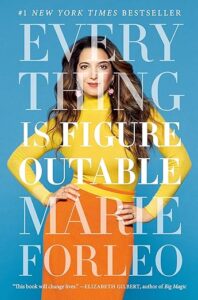
One of the things I decided I wanted to do in retirement was woodworking. They didn’t have furniture in my mind when I said it, because, you know, I’ve done a lot more, like fixing things in houses or installing picture windows or new doors, stuff like that. So I was very familiar with tools and stuff, but my wife pointed me to making furniture. And it’s like, talk about doing one of the hard things. It was like, “What the heck do I do that?” You know, I have no idea. And YouTube to the rescue, baby.
So that’s part of that, being a lifelong learner, right? Everything Is Figureoutable, as Marie Forleo likes to say. So, yeah, good for you, it helps keep you sharp and active. It’s really important, yeah, so good for you for having a productive hobby.
Well, the really nice thing about it, too, is I spent so many years spending a very substantial part of nearly every day in front of a computer screen, just like this one, making a living and being creative in different ways and trying to help people and these sorts of things. It was rewarding and all that, but it was sort of all that same thing in one way or another.
Whereas this is, use your hands to create something, and I don’t count typing on the keyboard as using my hands to create something. I mean, you know, really like, manipulate things in your hands and make something. And you know what? This is a really great life. Tip: Find a way to give yourself balance. And to be honest, for at least a couple of decades there, I did a pretty poor job of that. I had some little things that I didn’t do enough of. And I’m really glad to be able to do these things now,
It’s increasingly likely that people, especially young people, will get kind of sucked into a virtual world and have no other outlets for physical activity, manipulating objects in the real world, and being social in a real-world environment, which, as AI advances, will only get worse. Deep fakes become undetectable; it’s going to be hard to know what’s real and what’s fake in this new era.
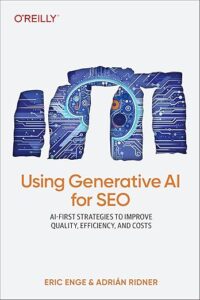
Well, in the culture or the way that you know, sites like Facebook and others operate to give you what you want, not what you need, because they’re just trying to drive consumption, which leads to more ad revenue. And to be honest, one of the great first applications of AI at scale is how to maximize that process of letting people fall into their own filter bubbles. And we’re not supposed to add on a bit and on, a bad thing, are we?
But it’s scary what could happen there. And I think a lot of people will care enough about understanding what’s really going on that they’ll be able to get around this and still live rich, constructive lives. But I fear, you know, if a different number of people will just fall into it and get trapped into believing whatever they’re told, basically, yeah, well,
So the inspiring message is to be the change you want to see in the world, right? So first of all, become aware that this is a problem. Maybe watch the movie The Social Dilemma, or something like that, and then do something, no matter how small it is, to make the world a better place in this regard.
Yeah, indeed. And that is a great thing to do. Always find a way to help people.
Awesome. Well, thank you for helping people through sharing your wisdom in this episode. If our listener or viewer wants to maybe learn more from you, get your books. I don’t know if you still do consulting, but how do they work with you or learn from you?
I still do some consulting. You can reach me via LinkedIn, where you know Eric Enge. I still occasionally check my Twitter account @stonetemple; that’s the handle. And so those are probably the two easiest ways. You can also go to pilotholding.com; there’s a contact form there as well.
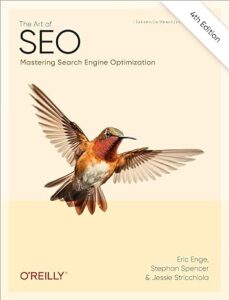
Awesome. And then, for your book, they can find the new one on Amazon, Using Generative AI for SEO.
Yes, indeed, yeah.
And, of course, our book together, The Art of SEO (4th edition). I can also get that on Amazon.
Yes, indeed, I have. It’s over there. I won’t go grab it, but no.
Awesome. Well, thank you so much, Eric, and thank you, listener. Now go do something small that makes the world a better place. We’ll catch you in the next episode. I’m your host. Stephan Spencer, signing off.
Important Links
Connect with Eric Enge
Books
Apps/Tools
Businesses/Organizations
People
Previous Marketing Speak Episodes
Previous Get Yourself Optimized Episode
YouTube Videos
Your Checklist of Actions to Take
- Aim for 25-30% efficiency gains with AI tools rather than expecting 4x productivity increases. I’ll approach AI implementation with sustainable, realistic goals that account for the significant time needed to review, edit, and refine AI-generated content before publishing.
- Create a loyal following by establishing myself as an expert who consistently delivers valuable content in my niche. I’ll focus on demonstrating my expertise, experience, authoritativeness, and trustworthiness (E-E-A-T) to attract customers who return directly to my content rather than relying solely on Google traffic.
- View disruption and change as opportunities rather than threats to my business. I’ll adopt the mindset that change creates opportunity and position myself to be among the first to understand the transformative shifts in my industry, giving me a competitive advantage.
- Demystify AI and other emerging technologies by taking incremental steps rather than trying to absorb everything at once. I’ll identify trusted experts in the field, learn one concept at a time, and stack my understanding gradually to avoid becoming overwhelmed by fear or uncertainty.
- Leverage large language models for what they do exceptionally well—summarization, outlining, and brainstorming—rather than expecting publish-ready content.
- Diversify my presence across multiple platforms beyond just Google search as the digital landscape becomes increasingly fractured. I’ll develop a multi-channel approach that includes social media, email, and other platforms to build authority and reach audiences where they actively engage, which also strengthens my SEO authority.
- Create content on niche, low-search-volume topics that showcase deep subject-matter expertise rather than just chasing high-volume keywords. I’ll use these specialized topics to differentiate myself from competitors and signal to both users and search engines that I possess genuine, comprehensive knowledge in my field.
- Continue investing in quality link building as a valuable SEO practice, despite algorithm changes. I’ll understand that while the landscape evolves, building authoritative links and multi-channel presence still matters significantly for establishing credibility and visibility in search results.
- Pursue challenging projects and learning opportunities that competitors avoid to become more in-demand and find greater satisfaction. I’ll identify difficult tasks that align with my goals, persist through the initial confusion, and develop mastery that sets me apart while creating genuine fulfillment beyond quick dopamine hits.
- Reach Eric Enge through LinkedIn, where he’s most active and responsive to inquiries. Find his contact form at pilotholding.com, or occasionally check his X account @stonetemple. Get his latest book, Using Generative AI for SEO, that cuts through the hype to reveal what actually works with AI tools, and The Art of SEO (4th Edition).

About the Host
STEPHAN SPENCER
Since coming into his own power and having a life-changing spiritual awakening, Stephan is on a mission. He is devoted to curiosity, reason, wonder, and most importantly, a connection with God and the unseen world. He has one agenda: revealing light in everything he does. A self-proclaimed geek who went on to pioneer the world of SEO and make a name for himself in the top echelons of marketing circles, Stephan’s journey has taken him from one of career ambition to soul searching and spiritual awakening.
Stephan has created and sold businesses, gone on spiritual quests, and explored the world with Tony Robbins as a part of Tony’s “Platinum Partnership.” He went through a radical personal transformation – from an introverted outlier to a leader in business and personal development.

About the Guest
ERIC ENGE
Eric Enge is President of Pilot Holding, and has founded, built, and sold 4 companies, including Stone Temple Consulting, an award-winning digital marketing agency. He is also co-author of The Art of SEO (a book that’s known as “the bible of SEO), and Using Generative AI for SEO.
Most business owners imagine AI will cut their content costs in half and triple their output. That fantasy rarely survives contact with reality.


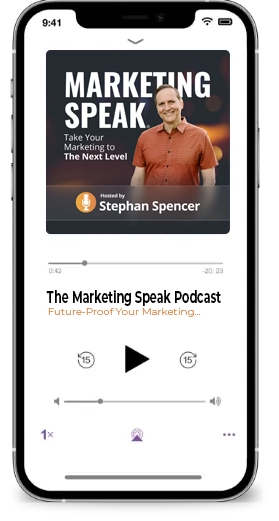





Leave a Reply